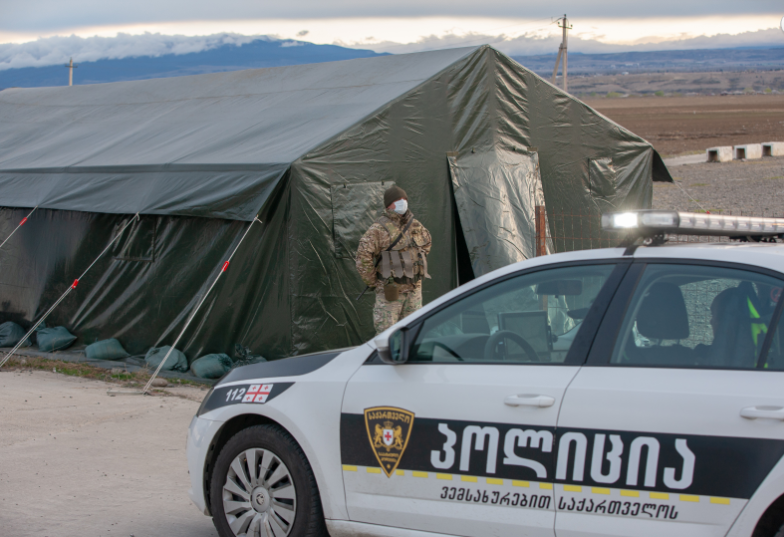საერთო ცხელი ხაზი +995 577 07 05 63


Photo: kvira.ge
The Human Rights Education and Monitoring Center (EMC) responds to the alleged arbitrariness of Ministry of Internal Affairs of Georgia employees in the process of fining citizens on the territory of Marneuli and Bolnisi municipalities and calls on the police to make community and human rights oriented decisions.
A state of emergency was declared in Georgia on March 21, 2020, in order to prevent the high risk of spreading the COVID-19 virus and for its proper prevention. On March 23, the Georgian government established a quarantine regime in Marneuli and Bolnisi municipalities, and these regions were strictly isolated from the rest of the regions. According to the official information, the employees of the Ministry of Internal Affairs of Georgia have fined hundreds of citizens on the basis of the violation of the regulations stipulated in the scope of the state of emergency in the past few days. Cases of fining citizens have been documented to happen in Bolnisi and Marneuli municipalities. However, the locals point out in their explanations (recorded by EMC) and also in the interviews given to the media that in some cases their fines were unjustifiably and arbitrarily imposed. They explained that in some cases, police officers should have been aware that they were not violating quarantine measures, they were leaving their homes to go to the market places and their number was not exceeding 10 people, however, police did not take these circumstances into account and fined the citizens on spot. In some cases, the use of profane language has been reported.
For example, according to the statement given by a resident of the village of Shulaveri, M.N , she did not break the state of emergency regulations and was at the store in the village to buy groceries, during which she was fined 3,000 GEL by the police. According to M.N, she lives with her elderly mother and younger nephew. Her mother is suffering from a chronic illness and on March 28 she called an ambulance due to her deteriorating health, and then prepared food for the family members and went to the store to buy bread. She noted, that when she arrived at the store, the owner of the store was not there yet and stopped at the establishment to wait for the owner, two of her villagers were also present in front of the store, to buy some groceries. According to M.N, four police officers arrived at the scene and demanded that she be escorted to the police station. M. N. noted that police officers did not take into account her indication that she had gone to the store to buy bread and that a sick mother and a young nephew were waiting her at home. According to her, one of the police officer said “I don’t care what you wanted to buy, your family members can eat stone for all I care” and cursed at her. She was charged with administrative offense at the Shulaveri police station and fined 3,000 GEL for violating the state of emergency. Two of her fellow villagers were also fined. According to M.N, she told the police that she did not know how to read and write in Georgian, so she could not get acquainted with the drawn-up protocol, but the police officers did not provide the translation of the protocol in a language she could understand.
After the announcement of the quarantine regime in Marneuli and Bolnisi municipalities, locals note about the serious social problems created in the villages. Social infrastructure, services and resources are already weak in these municipalities, however, in the current situation, when a large number of families are unable to work due to restrictions on freedom of movement and get the minimum daily income they had, in turn, the social situation of the locals has worsened. Furthermore, citizens note that in some villages after the introduction of quarantine, the price of some products have increased, which makes it harder for the locals to purchase them. So far, the state has not pursued a special policy of social support for families left without employment and subsistence, neither in these municipalities nor in the country as a whole. Neither do the local municipalities have such policies in place. Their existing social support programs are fragmented and limited to a small circle of beneficiaries.
For the local communities living in poor social conditions, especially where proper communication with governmental agencies and deliver of terms and conditions of the quarantine on the language understood by the community is still problematic; repressive approach from the government and in certain cases arbitrariness, contradicts the principles of social and just government.
In this regard, it is important for the Ministry of Internal Affairs to strengthen the proper informing efforts of the citizens about the imposed quarantine and the obligations of the citizens in a language they can understand, as well as to show high social sensitivity and interest in local acute social needs in the process of enforcing the set regulations. In these situation, it is important for the police to understand the importance of trust-based and context-based approaches to the community, and not to aggravate the already difficult and isolated social environment with repressive approaches.
Bearing this in mind, EMC calls on
Georgian government, City hall of Marneuli and Bolnisi municipalities to
Ministry of Internal Affairs of Georgia
The website accessibility instruction